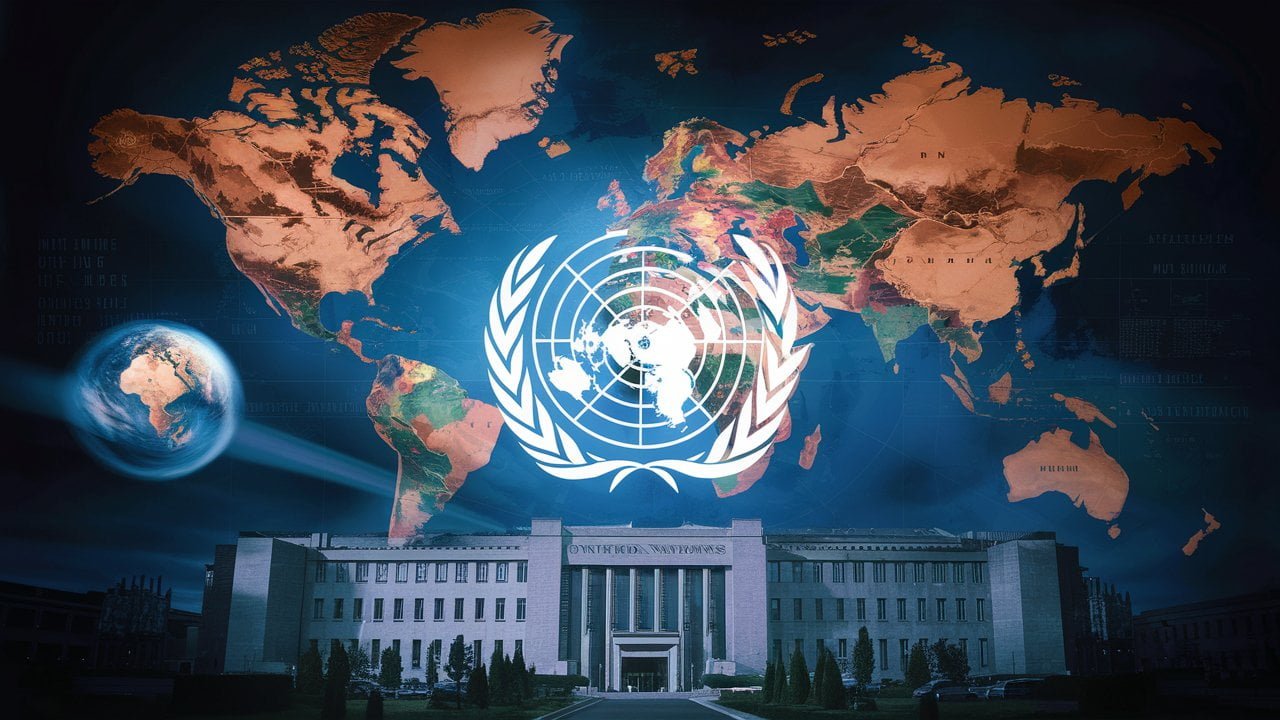The United Nations (UN) stands as a pivotal player on the global stage, instrumental in shaping the intricate dynamics of international relations. Established in the aftermath of World War II, the UN embarks upon its endeavors with a mission deeply rooted in fostering cooperation and promoting peace among nations.
Delving into the annals of history, one witnesses how the harrowing experiences of conflict propelled world leaders to unite under a common umbrella for collective security and prosperity.
The inception of the UN marked a turning point where sovereignty intertwined with shared obligations, setting forth an intricate framework to surmount global challenges collectively.
Since its inception, the United Nations has evolved into a multifaceted institution embodying a spectrum of objectives aimed at enhancing diplomacy and bolstering international stability.
The pillars supporting this edifice comprise an array of bodies such as the General Assembly, Security Council, and specialized agencies operating synergistically to uphold peacekeeping efforts and champion humanitarian causes.
As we dissect through the layers of its structure, it becomes apparent how decision-making mechanisms within these bodies reverberate far beyond their chambers, casting ripples that influence the very tapestry of state interactions on a worldwide scale.
Amidst a complex web of intersecting interests and divergent ideologies, the UN serves as both arbiter and enabler, mediating disputes while also nurturing collaborative endeavors that transcend geographical boundaries.
Importance of the United Nations.
The United Nations (UN) plays a vital role in international relations by serving as a cornerstone for promoting global peace and security through various conflict resolution mechanisms.
One notable example of the UN’s efforts in maintaining peace is seen through its peacekeeping missions, where troops are deployed to regions experiencing conflicts to facilitate peaceful resolutions.
The presence of UN peacekeepers has been crucial in preventing escalation of violence in places like Cyprus and Rwanda, illustrating the organization’s commitment to mitigating global conflicts for the greater good.
Furthermore, the UN serves as a hub for fostering international cooperation on critical issues such as human rights, humanitarian aid, and sustainable development. Through specialized agencies like the World Health Organization (WHO) and UNICEF, the organization leads efforts to address humanitarian crises worldwide.
For instance, during natural disasters or health emergencies, these agencies coordinate relief efforts and provide assistance to affected populations swiftly and efficiently. By championing collaborative initiatives aimed at sustainable development goals (SDGs), the UN underscores its commitment to improving livelihoods globally through coordinated action.
In addition to peacekeeping and humanitarian efforts, the United Nations contributes significantly to maintaining global order by providing a platform for diplomatic negotiations among member states. The General Assembly serves as a forum where nations can discuss key issues impacting international relations collectively.
Moreover, the Security Council acts as a body with authority to make decisions on matters related to international peace and security. As seen in instances where diplomatic tensions arise between countries, the UN offers a neutral ground for dialogue and negotiation, enabling conflicting parties to seek peaceful resolutions under its auspices.
This structured dialogue mechanism prevents potential escalations into full-blown conflicts and underscores the essential role played by the UN in preserving global stability.
Structure and Functions of the UN.
The United Nations functions through a well-defined structure that comprises various bodies, each with distinct roles in facilitating international relations. The General Assembly, composed of representatives from all member states, serves as a forum for deliberation on global issues, encouraging dialogue and consensus-building among nations.
It provides a platform for addressing a wide array of topics such as peace and security, human rights, and sustainable development. One significant function of the General Assembly is its ability to adopt resolutions that guide the collective actions of member states.
In contrast, the Security Council holds a prominent position within the UN system in maintaining international peace and security. With primary responsibility for authorizing military interventions and imposing sanctions, the Security Council plays a crucial role in responding to conflicts worldwide.
Its decisions have direct implications on member states’ sovereignty and their obligations under international law. For instance, resolutions passed by the Security Council can mandate economic sanctions or authorize peacekeeping operations in conflict zones like South Sudan or Syria.
Furthermore, specialized agencies within the UN network, such as the World Health Organization (WHO) or United Nations Educational, Scientific and Cultural Organization (UNESCO), focus on specific areas like health or education to address global challenges effectively.
These agencies operate autonomously but align their activities with broader UN objectives to promote cooperation between countries. For example, WHO’s response during health crises like the Ebola outbreak underscores its vital role in coordinating international efforts to combat infectious diseases collaboratively.
The decision-making process within the UN framework entails negotiations and consensus-building among member states to reach agreements that guide collective action. While this approach emphasizes inclusivity and diplomatic solutions to global problems, it also reflects power dynamics among nations influencing outcomes.
Understanding these intricate mechanisms is crucial for comprehending how decisions at the UN level shape international relations significantly and impact state behavior globally. By analyzing these structures and functions comprehensively, observers can grasp the complexities of diplomacy within the multilateral framework of the United Nations.
Challenges Faced by the United Nations.
The United Nations faces a multitude of challenges in its mission to foster global peace and cooperation. One significant hurdle is the pressing need to address contemporary global issues such as climate change, terrorism, and pandemics. Climate change remains a critical concern requiring coordinated international efforts for mitigation and adaptation strategies.
The UN plays a central role in shaping discussions on climate action through platforms like the annual Conference of Parties (COP) under the UN Framework Convention on Climate Change (UNFCCC). Similarly, terrorism continues to threaten stability worldwide, necessitating cohesive responses through frameworks such as the UN Security Council resolutions on combating terrorism.
Despite its crucial mandate, the United Nations has been subjected to critiques questioning its effectiveness and efficiency in fulfilling its objectives. Some critics argue that bureaucratic inefficiencies hinder timely responses to crises while others raise concerns about inequalities in power dynamics within UN bodies.
Addressing these criticisms is vital for enhancing the organization’s legitimacy and credibility in addressing global challenges effectively. Furthermore, ongoing debates surrounding reforms within the UN underscore the necessity of adapting to evolving geopolitical landscapes to maintain relevance in modern international affairs.
Discussions on restructuring decision-making processes or enhancing transparency are integral to ensuring that the UN remains a dynamic force for positive change.
The debate around reforms needed to enhance the UN’s relevance extends beyond internal procedural matters; it also delves into broader issues of representation and decision-making power distribution among member states.
For instance, proposals for expanding the membership of the UN Security Council or revisiting veto powers have sparked discussions on democratizing key decision-making processes within this influential body. Such deliberations highlight not only institutional challenges but also ideological differences among member states regarding sovereignty and collective responsibility.
Resolving these complex issues will be instrumental in positioning the United Nations as an effective actor capable of navigating today’s intricate global landscape with agility and purpose.
Collaboration with Member States.
Effective collaboration between the United Nations and its member states plays a crucial role in translating resolutions into meaningful actions that address pressing global challenges. Member states are key stakeholders responsible for implementing UN decisions at the national level, making their engagement pivotal for successful outcomes.
For instance, the joint efforts of countries in supporting UN peacekeeping missions have contributed significantly to maintaining stability in conflict zones. Furthermore, partnerships forged through initiatives like the Sustainable Development Goals (SDGs) showcase how coordinated action between the UN and member states can drive progress towards shared objectives such as poverty eradication and environmental sustainability.
Despite the benefits of cooperation, disagreements among member states can pose significant challenges to UN initiatives. Differing national interests, political alliances, and historical contexts often result in contentious debates within UN forums on issues ranging from humanitarian intervention to climate change regulations.
These disagreements can stall decision-making processes and impede the efficiency of UN mechanisms aimed at addressing complex global problems. An example of this is seen in debates over Security Council resolutions related to conflicts where divergent views among powerful member states can potentially hinder timely intervention strategies by the UN.
Analyzing how disputes impact UN initiatives underscores the need for diplomatic dialogue and compromise among member states to navigate contentious issues effectively. The dynamics of power politics within the UN system require delicate negotiations and consensus-building to bridge gaps and find common ground for collective action.
Successful case studies like the Paris Agreement on climate change demonstrate that overcoming differences through persistent dialogue can lead to landmark agreements that advance global cooperation.
By recognizing these challenges and adopting inclusive approaches that accommodate diverse perspectives, the UN can strengthen its mandate as a facilitator of international collaboration despite inherent complexities in inter-state relations.
Impact on Global Governance.
The United Nations (UN) plays a pivotal role in shaping global governance by influencing the development of norms and regulations in international law. Through conventions, treaties, and resolutions adopted within its framework, the UN establishes standards that member states are expected to uphold.
For example, the Universal Declaration of Human Rights, a foundational document of the UN, sets forth fundamental rights and freedoms that serve as a basis for national legal systems worldwide. The UN’s codification of international norms not only guides state behavior but also fosters a shared understanding of rights and responsibilities among nations.
Decisions made at the UN level have far-reaching implications for national policies in member states. When countries participate in UN forums and adhere to international agreements, they align their domestic laws and practices with global standards.
For instance, when states ratify conventions like the Paris Agreement on climate change or the Convention on the Rights of Persons with Disabilities, they commit to implementing measures that comply with these multilateral accords. The influence of UN decisions extends beyond diplomatic circles to impact legislative reforms, judicial interpretations, and executive actions within individual nations.
One of the core functions of the UN is upholding democratic principles and human rights on a global scale. By monitoring human rights violations, providing technical assistance to strengthen democratic institutions, and issuing reports on compliance with international treaties, the UN serves as a pillar of accountability in promoting good governance practices worldwide.
For instance, the Office of the High Commissioner for Human Rights conducts investigations into human rights abuses across different regions and advocates for remedial actions to safeguard individuals’ rights against authoritarian regimes or oppressive policies.
The UN’s emphasis on democratic ideals contributes to fostering inclusive societies where civil liberties are respected and protected under international law.
Future Prospects for the United Nations.
In looking ahead, the United Nations (UN) stands at a critical juncture where adaptation is pivotal to maintaining its effectiveness. Potential areas for improvement within the organization include enhancing transparency in decision-making processes and increasing accountability mechanisms across its agencies.
Embracing technological advances to streamline operations and improve communication channels could bolster the UN’s capacity to address complex global challenges efficiently.
Furthermore, as geopolitical dynamics continue to evolve, the UN must recalibrate its role to navigate emergent issues like cyber warfare, misinformation campaigns, and non-state actor threats effectively.
Adapting to these transforming landscapes by fostering innovative diplomatic strategies and strengthening partnerships with regional organizations will be imperative for the UN to remain a relevant and influential force in shaping international relations.
In conclusion, while facing assorted criticisms and demands for reform, the ongoing relevance of the UN remains undeniable. As it continues to evolve and adapt alongside shifting global norms and challenges, the prospects for future engagements in international relations underscore the enduring importance of this multilateral institution in navigating an increasingly interconnected world.




